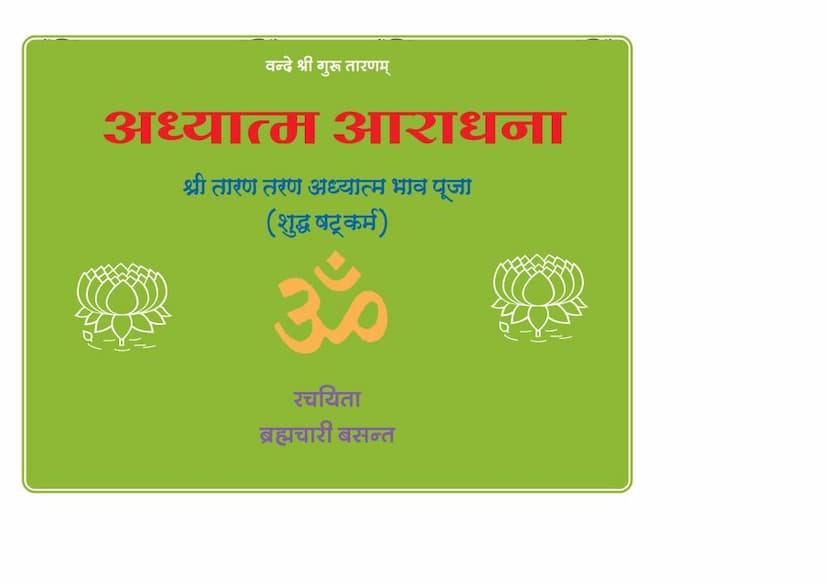Adhyatma Aradhana
Added to library: September 1, 2025

Summary
This Jain text, "Adhyatma Aradhana" (Spiritual Worship) by Basant Brahmachari, published by Taran Taran Sangh Bhopal, is a profound exploration of Jain philosophy, particularly emphasizing the teachings of Acharya Taran Taran. The book is presented as a guide to spiritual practice and self-realization, focusing on the essence of Jainism as understanding and experiencing one's true self.
Here's a comprehensive summary of its key aspects:
Core Philosophy and Teachings:
- The True Self (Shuddhatma): The central theme is the realization of the soul (Atma) as the true God. The book strongly advocates that the soul itself is the divine, possessing infinite knowledge, bliss, and purity (Shuddhatma, Parmatma, Brahmamaya). This is a direct reflection of Taran Taran's teachings.
- Rejection of External Worship: While acknowledging the traditional concepts of Dev (God), Guru, and Shastra (Scripture), the text emphasizes that the true worship lies in recognizing these qualities within oneself. External worship without internal realization is considered superficial. The book guides readers to find the divine within their own soul, the "temple of the body."
- Nishchaya and Vyavahar Naya (Ultimate Truth and Conventional Truth): The text consistently distinguishes between the ultimate reality (Nishchaya Naya) of the soul's inherent divinity and the conventional practices and forms (Vyavahar Naya) that can lead to this realization. True worship (Nishchaya Puja) is the internal experience of the soul, while conventional practices are seen as means to that end.
- Self-Reliance and Inner Strength: The book stresses that true salvation and happiness come from within, through self-effort and self-knowledge. It discourages reliance on external powers or rituals for liberation.
- Importance of Discrimination (Bhed Gyan): The ability to discriminate between the self (Atma) and the non-self (pudgal, body, mind, senses) is crucial for spiritual progress. This discrimination is the foundation for realizing one's true nature.
Key Practices and Concepts:
- Adhyatma Aradhana (Spiritual Worship): This is the core practice advocated, meaning the worship of one's own soul. It involves understanding the nature of the soul, contemplating its attributes, and experiencing its inherent bliss.
- Shuddha Shatkarma (Six Essential Practices): The book likely expounds upon six fundamental spiritual disciplines. While not explicitly detailed in the provided excerpts, these are typically understood in Jainism as: Samayika (meditation), Stuti (praise), Vandana (salutation), Pratikramana (atonement/introspection), Kayotsarga (self-restraint/body-stillness), and Pratyakhyana (renunciation/vow).
- Dev Puja (Worship of God): The book defines true Dev Puja as the internal realization of the soul's divine attributes, not merely external rituals. It emphasizes that the soul is the true God, omniscient, omnipotent, and blissful.
- Guru Upasana (Worship of the Guru): The text promotes the veneration of true spiritual guides (Gurus) who embody the teachings and guide disciples towards self-realization. However, it also emphasizes that the ultimate Guru resides within the soul. The teachings of Taran Taran are highlighted as the highest guidance.
- Shastra Adhyayan (Study of Scriptures): The importance of studying scriptures that reveal the nature of the soul and the path to liberation is emphasized. The fourteen works of Acharya Taran Taran are central to this study.
- The Eight Angas of Samyak Darshan (Eight Limbs of Right Faith): The text discusses and elaborates on the eight essential qualities that constitute true faith (Samyak Darshan), including: Nishankita (freedom from doubt), Nishkanksha (freedom from desire), Nirvichikitsa (freedom from disgust), Greshna (admiration of the path), Vatsalya (affection for fellow spiritual seekers), Samvegin (spiritual fervor), Prabhava (spreading the glory of the faith), and Anukampa (compassion).
- Bhava Puja (Worship of Inner Feelings/Intentions): This form of worship focuses on the purity of one's intentions and inner state rather than outward rituals.
- Four Bhavanas (Meditations): The text encourages cultivation of four Bhavanas: Maitri (friendship/benevolence), Pramod (joy in others' virtue), Karunya (compassion), and Madhyasthya (equanimity/neutrality). These are crucial for spiritual development and harmonious living.
- The Threefold Nature of the Soul (Atma): The book likely discusses the concepts of Bahyaratma (outer soul, identifying with the body), Antaratma (inner soul, the aspirant), and Paramatma (supreme soul, the realized soul).
- Life's Impermanence and the Pursuit of Salvation: The text repeatedly reminds readers of the transient nature of life and the importance of using the human birth wisely to attain liberation from the cycle of birth and death.
- Practical Guidance and Life Principles: The latter part of the book contains a vast collection of aphorisms and life principles ("Jeevan Jeene Ke Sutra"). These cover various aspects of life, including ethical conduct, the law of karma, the importance of self-control, the transient nature of worldly possessions and relationships, the pursuit of true happiness through spirituality, and the dangers of ignorance and worldly attachments.
Historical and Inspirational Context:
- The book highlights the life and mission of Acharya Taran Taran, describing him as a revolutionary spiritual leader who emerged in a time of religious darkness and ritualism.
- The extensive "Prakashkiya" (Editorial) section details the significant efforts undertaken by the Taran Taran Adhyatma Prachar Yojana Kendra and its dedicated followers in propagating Taran Taran's teachings throughout India through various initiatives like tours, camps, scripture recitations, and literature publication. This highlights the devotional and service-oriented approach of the organization.
Overall Purpose:
"Adhyatma Aradhana" aims to serve as a practical manual for spiritual seekers, offering a clear path to self-realization based on the profound philosophy of Acharya Taran Taran. It seeks to awaken spiritual consciousness in individuals, guiding them away from external rituals and towards the internal experience of their own divine nature, ultimately leading to liberation (Moksha). The book's numerous verses, bhajans, and life principles are designed to be studied, contemplated, and practiced for spiritual upliftment.